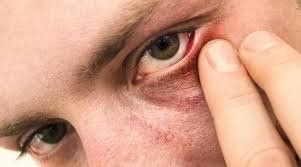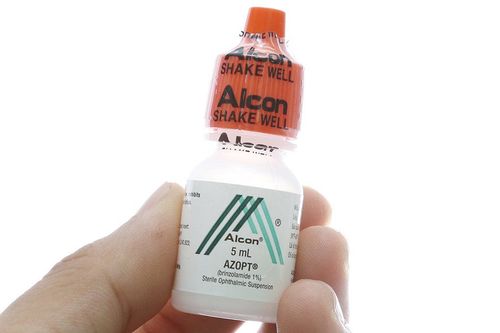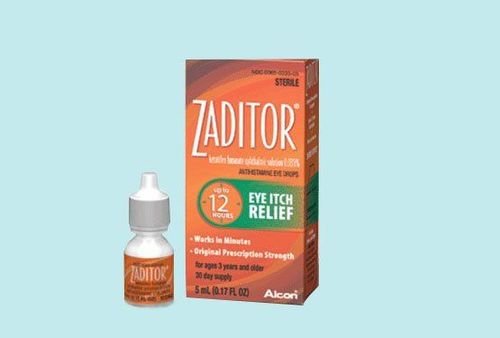This is an automatically translated article.
Betagan is an effective drug in reducing intraocular pressure and is used in patients with glaucoma or chronic intraocular pressure. The following content will describe more clearly the effects, pharmacodynamic principles, side effects and notes when using the drug.
1. Effects and pharmacodynamics of Betagan
Betagan is a beta blocker used to treat open-angle glaucoma and other causes of high pressure inside the eye.
Betagan with levobunolol hydrochloride activity 0.5% is effective in lowering intraocular pressure. When betagan is used in the eyes, it will lower the intraocular pressure to the normal level of the eye whether the disease is accompanied by glaucoma or not. Elevated intraocular pressure is a major risk factor in the pathogenesis of glaucoma-associated visual field loss. The higher the intraocular pressure, the more likely it is to damage the optic nerve and cause visual field loss.
The exact mechanism of action of levobunolol in lowering intraocular pressure has not been elucidated. Betagan's ocular pressure-lowering effects have little or no effect on pupil size, in contrast to the miosis-induced effects of choline-secreting agents.
2. Usage and notes when using Betagan
Betagan should not be used when the patient is suffering from asthma, severe COPD, bradycardia or a heart condition with atrioventricular block "AV block".
This medicine should not be used if you are allergic to the active ingredient levobunolol or have:
Asthma, or severe chronic obstructive pulmonary disease (COPD); Bradycardia A heart condition known as atrioventricular block "AV block". Tell your doctor if:
Respiratory problems such as bronchitis or emphysema; Heart problems; Peripheral vascular disease such as Raynaud's syndrome; Diabetes; Thyroid disorders; Causes muscle disorders such as myasthenia gravis. Tell your doctor if you are pregnant or breastfeeding.
How to use Betagan
Follow the directions on your medication label and read all leaflets. Do not use the drug while wearing contact lenses because it interferes. In addition, preservatives in Betagan can permanently stain lenses. Use the medication at least 15 minutes before you want to put on your contact lenses.
Need to wash hands thoroughly before using Betagan medicine
To put the drops in the eyes: Tilt your head back a little, then pull down the lower eyelid to put the drops directly in. Close your eyes for 1 or 2 minutes to allow the medicine to penetrate.
Use only the dose of this eye drop prescribed by your doctor.
Do not touch the tip of the dropper with your hands or directly on the eyes. A dirty dropper can infect the eye which can lead to serious vision problems.
Store at room temperature away from sources of high heat and direct light. Close the cap of the medicine bottle tightly when not in use.
Tell your doctor right away if there is any damage or infection in your eyes while using this medicine. If you have a medical condition that requires surgery, talk to your surgeon first that you are taking Betagan. It may be necessary to stop taking the drug for a short time for evaluation.
What should I do if I miss a dose?
Use the medicine as soon as you remember, but skip the missed dose if it is almost time for your next dose. Do not use two doses at the same time.
If the drug is overdosed?
Overdose symptoms may occur such as slow heart rate, feeling light-headed or short of breath.
What should be avoided when using Betagan?
Avoid driving or dangerous activities until you know that Betagan medicine has stopped affecting the body because the body's reflexes may be impaired.
3. Side effects of Betagan
Get emergency medical help if there are signs of a reaction to the medicine (rash, difficulty breathing, swelling of the face or throat) or a serious skin reaction (fever, sore throat, burning eyes, skin pain, red or purple skin rash with blistering)
Betagan can cause serious side effects. Call your doctor at once if you have the following symptoms:
Severe swelling, itching, burning, redness, pain, or discomfort in or around your eyes; Bronchospasm (wheezing, chest tightness, shortness of breath); A light feeling like you might pass out; slow heart rate, weak pulse; or Numbness, cold feeling, or pale fingers or toes. Other less common side effects of Betagan may include:
Mild burning, stinging or discomfort in the eyes; Feeling like there is something very unpleasant in the eye; Blurred vision; Dizziness, weakness; Headache Rash or itching. This is not a complete list of other possible side effects.
Other drugs may affect the use of Betagan, including prescription and over-the-counter medicines, vitamins, and herbal products.
Like many other drugs, before taking Betagan, patients need to carefully read the instructions for use, if they have any questions, they can discuss more with their doctor for necessary indications.
Please dial HOTLINE for more information or register for an appointment HERE. Download MyVinmec app to make appointments faster and to manage your bookings easily.













